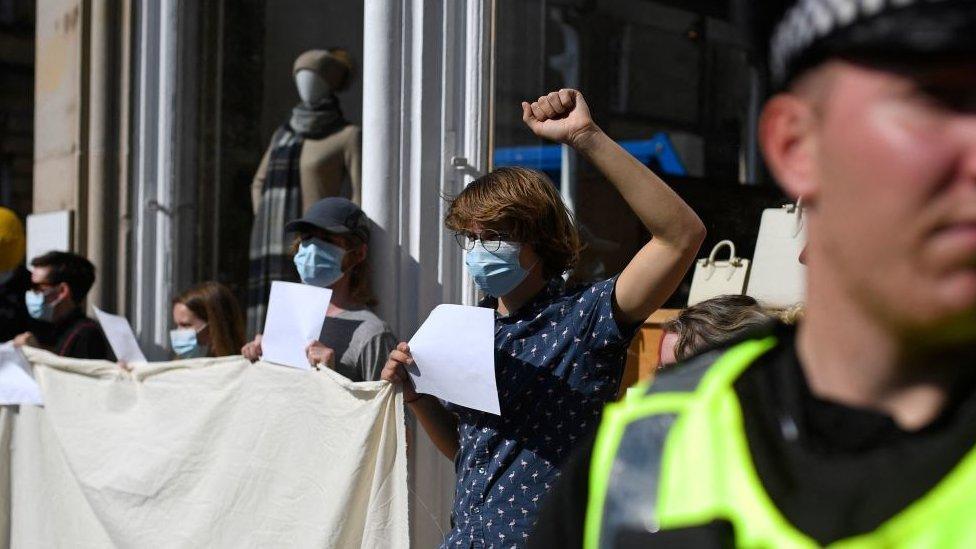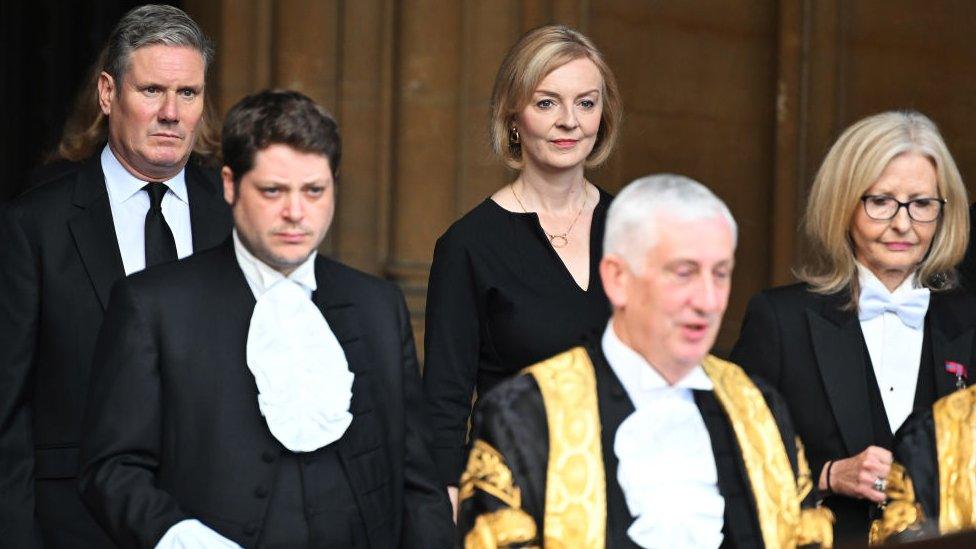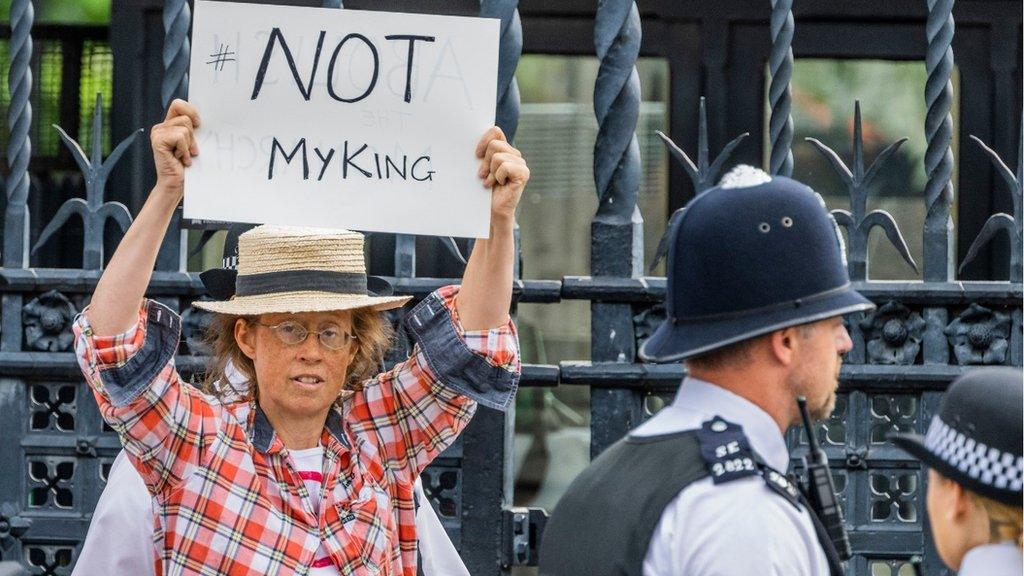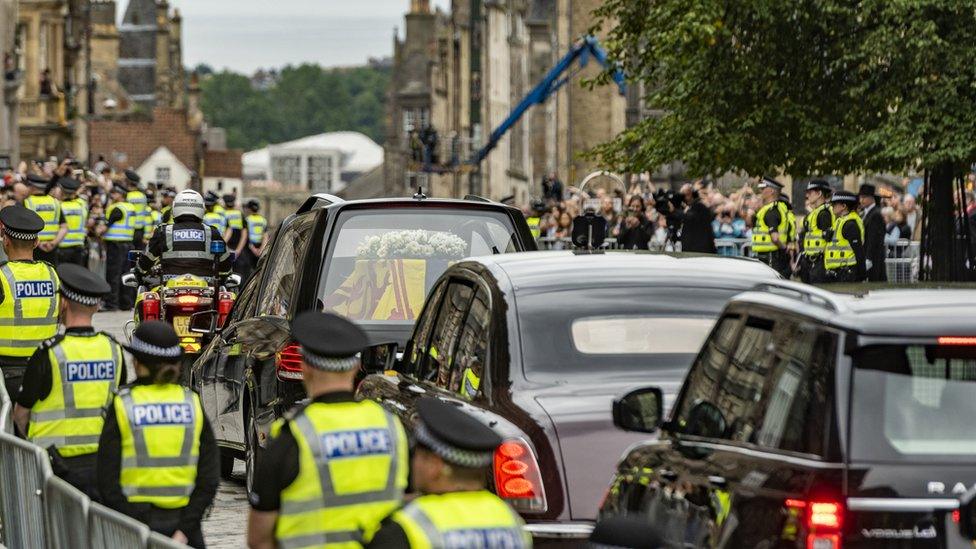Keir Starmer urges protesters to respect those mourning Queen
- Published

Activists in Edinburgh held up blank placards in opposition to the arrests of protesters
Sir Keir Starmer has urged protesters to "respect" people who want to mourn the Queen and not to "ruin" the experience for them.
The Labour leader said the ability to protest was "one of the great British traditions", saying: "I think it can be done in the spirit of respect."
A number of people have been arrested in recent days for staging protests at events to mark the monarch's death.
This has prompted concerns about restrictions on freedom of speech.
Asked about the police response to those protesting, Sir Keir told BBC Breakfast: "The word I'd use around that issue is 'respect'.
"I think if people have spent a long time waiting to come forward to have that moment as the coffin goes past, or whatever it may be, I think: respect that, because people have made a huge effort to come and have that private moment to say thank you to Queen Elizabeth II.
"Obviously we have to respect the fact that some people disagree. One of the great British traditions is the ability to protest and to disagree, but I think if it can be done in the spirit of respect... Respect the fact that hundreds of thousands of people do want to come forward and have that moment, don't ruin it for them."
"But also we do need to respect the fact that other people must be entitled to express their different views," he added.
Police Scotland have charged two people in connection with allegedly breaching the peace following separate incidents earlier this week.
They include a woman who was holding a sign with an expletive and the words "abolish the monarchy" during a proclamation ceremony for the new King.
Another man was arrested after reportedly heckling Prince Andrew as the royal procession moved along Edinburgh's Royal Mile.
Meanwhile, in Oxford a man was arrested on suspicion of a public order offence, after shouting "who elected him?" during a proclamation ceremony. The man said he was later "de-arrested" by police.
On Tuesday, activists gathered outside St Giles' Cathedral in Edinburgh carrying "blank canvases" to protest against the arrests.
Conservative MP David Davis is among those who has expressed concerns about the arrests, in a letter to the chief constable of Police Scotland, external.
"Being disrespectful is not a crime in this country," the former minister told the BBC.
"We haven't got King Vladimir Putin, we've got King Charles, and tolerating disrespect and people who are saying things that annoy you is a very, very important part of democracy."
The right to peacefully protest is set out in the Human Rights Act.
But other laws allow the police to curtail freedoms when it would be necessary and proportionate to do so - particularly where it would be necessary to protect national security and public safety or prevent disorder or crime.
The National Police Chiefs' Council said the ability to protest was "a fundamental part of democracy" and officers must "balance these rights against those who wish to grieve and reflect".

Sir Keir was among those at Westminster Hall when the King addressed MPs and peers
The King and his sons will walk together behind the Queen's coffin in a procession later from Buckingham Palace to Westminster Hall, where the Queen will lie in state.
Hundreds of thousands of people are expected to queue for hours to pay their respects to the monarch.
Sir Keir said he would be part of the reception committee to receive the coffin and would return to Westminster Hall with his wife and children in the evening to pay their "personal respects to a remarkable sovereign".
He described the response to the Queen's death as "very moving" and an "incredible moment".
- Published16 September 2022

- Published13 September 2022
